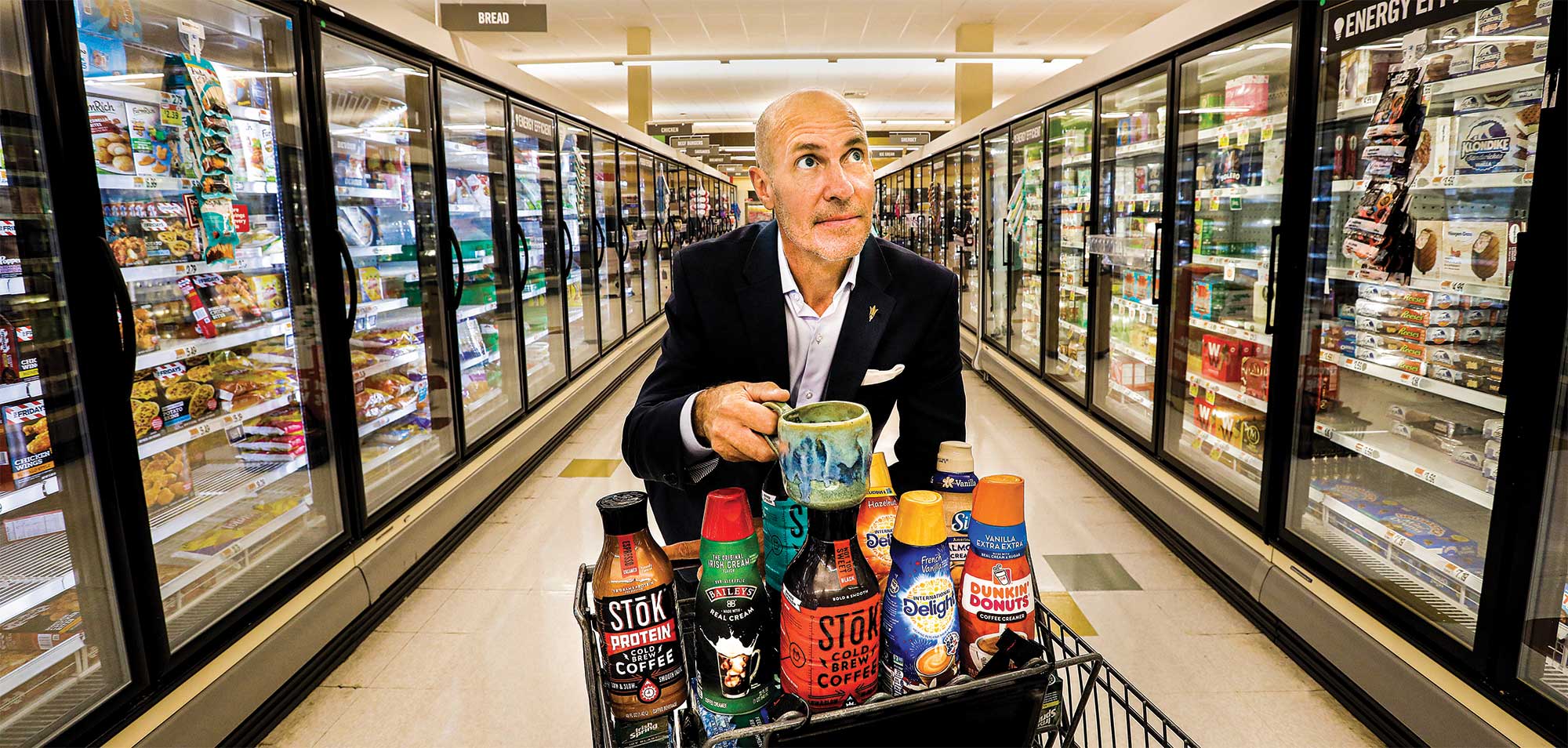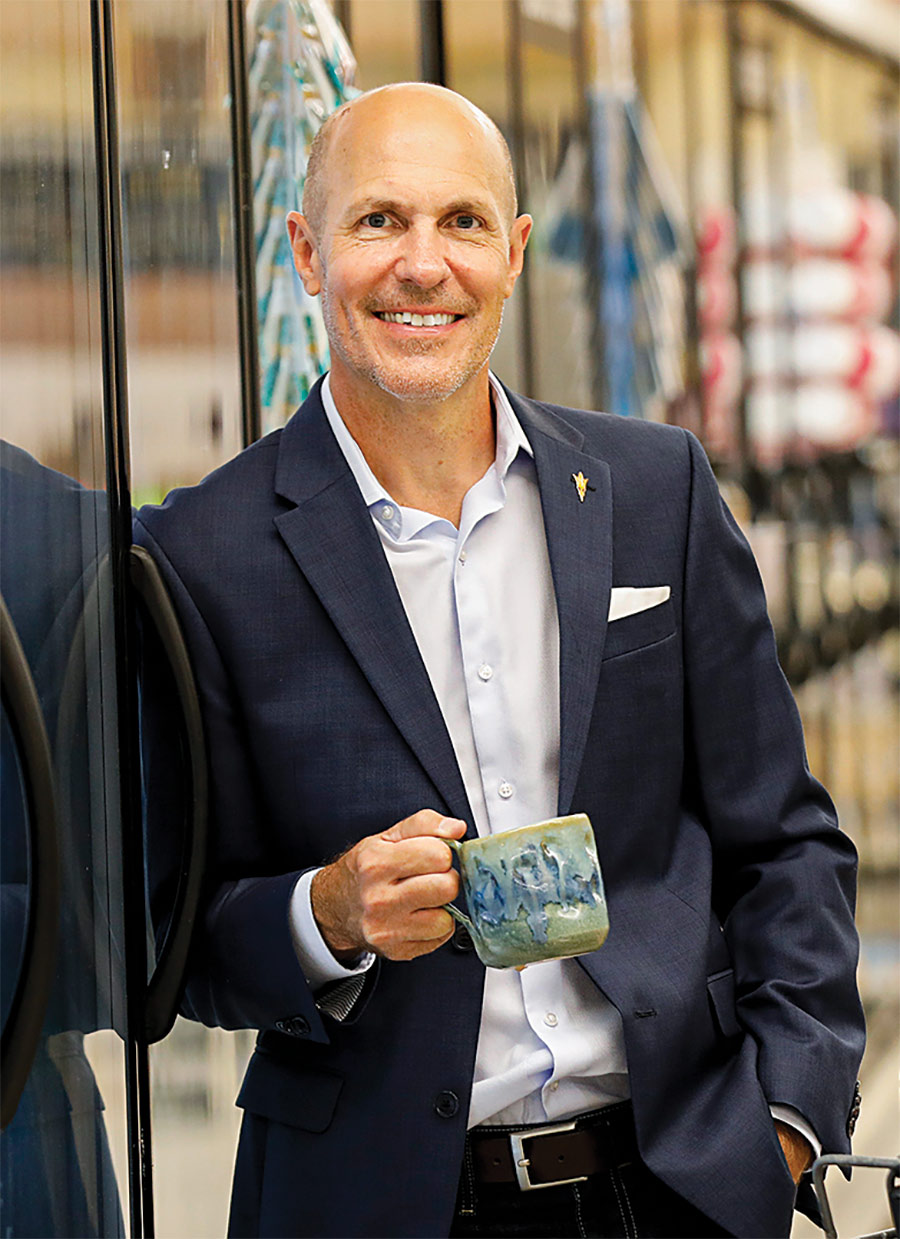nstead of overanalyzing your next career move, Scott Moffitt (BS Finance ’88), president of the $1.4 billion coffee creamer and beverage division of Danone North America, suggests you “think ‘future back’ — that is, think about where you want to end up at retirement and realize how much time you’ve got to find your way there.”
Moffitt knows from experience that the best path to business learning and success is not necessarily the straightest one. He came to ASU to study computer systems engineering but ended up majoring in finance. Upon graduation, he says, “I aspired to work on Wall Street. The bright lights and big city attracted me. I thought the bigger the arena, the better.”
But Moffitt was offered a management training position at Norwest Bank (later acquired by Wells Fargo) in Minneapolis — a far cry from the Big Apple, but which turned out to be a “fantastic experience” he couldn’t pass up.
Still, finance itself turned out to be a starting point. Moffitt realized this when he visited one of the bank’s clients, General Mills. He had lunch with the assistant treasurer in Minneapolis and happened to walk through the marketing department, which changed the trajectory of his career.
“They looked like they were doing meaningful work, work that impacted consumers’ lives, and having fun while doing it,” recalls Moffitt. He met a marketer there who explained more about their marketing operation and realized this was what he wanted to do.
(BS Finance ’88)
(BS Finance ’88)
nstead of overanalyzing your next career move, Scott Moffitt (BS Finance ’88), president of the $1.4 billion coffee creamer and beverage division of Danone North America, suggests you “think ‘future back’ — that is, think about where you want to end up at retirement and realize how much time you’ve got to find your way there.”
Moffitt knows from experience that the best path to business learning and success is not necessarily the straightest one. He came to ASU to study computer systems engineering but ended up majoring in finance. Upon graduation, he says, “I aspired to work on Wall Street. The bright lights and big city attracted me. I thought the bigger the arena, the better.”
But Moffitt was offered a management training position at Norwest Bank (later acquired by Wells Fargo) in Minneapolis — a far cry from the Big Apple, but which turned out to be a “fantastic experience” he couldn’t pass up.
Still, finance itself turned out to be a starting point. Moffitt realized this when he visited one of the bank’s clients, General Mills. He had lunch with the assistant treasurer in Minneapolis and happened to walk through the marketing department, which changed the trajectory of his career.
“They looked like they were doing meaningful work, work that impacted consumers’ lives, and having fun while doing it,” recalls Moffitt. He met a marketer there who explained more about their marketing operation and realized this was what he wanted to do.
In some ways, Moffitt’s childhood prepared him to embrace change, even when it came in unexpected forms. He lived in Isfahan, Iran, during his elementary school years, while his father worked for Bell Helicopter. When the Iranian Revolution started in 1979, martial law was declared, and he saw tanks take up positions in the streets. In a matter of days, it seemed the Shah’s regime, friendly to U.S. interests, was overthrown, and Moffitt’s family was evacuated out in a C130 Air Force cargo plane.
From Iran, his family moved to Greece, where he went to high school. As a member of his high school’s cross-country team, Moffitt had the opportunity to compete at meets from Frankfurt, Germany, to Cairo. He says he “grew up realizing how wide the world is but also how interconnected, and how similar people are, how human needs and experiences are more similar than people think.”
His family’s home base in the U.S. was in Arizona, which brought him to ASU. He describes life at ASU as “an all-you-can-eat buffet. You have to be judicious with your time, make choices about where to devote your energy, and take full advantage of ASU’s breadth of opportunities.” He credits the university with teaching him life management skills as a result.
At ASU, “I became a better learner,” Moffitt says. “I learned how to digest large amounts of information more efficiently.” The strategies he acquired for learning have been especially valuable as he’s moved to new companies and industries throughout his career, requiring him to learn new categories, cultures, and ways of working quickly.
“I’m a strong believer in taking risks in your career, and I think it’s better than playing it safe and not pushing outside of your comfort zone,” says Moffitt. For him, accepting the position of executive vice president of sales and marketing at Nintendo in 2011 was a bold departure.
“People advised me when making a career move to change one, or at most, two, dimensions,” Moffitt recalls. “Work with the same distribution channels but change product categories, or change distribution channels within the same category, but don’t change both. When I joined Nintendo (from Henkel), I changed everything.”
The move away from his background in consumer packaged goods such as beverages and soap entailed learning an entirely new industry — video games. Moffitt considers himself a casual gamer “who spent four years of high school lunch money on Donkey Kong.” But that was hardly preparation for the steep learning curve he faced at Nintendo, where he got to work with Shigeru Miyamoto, whom he describes as “the Walt Disney of gaming.” Miyamoto created some of the most iconic games and characters, such as Donkey Kong, Mario Brothers, and The Legend of Zelda.
Moffitt had to learn a new industry and a new culture: At Nintendo, he encountered a distinctly Japanese ethos of “humility, almost reverence for game fans — putting them first, even at the expense of profits.”
The culture of Nintendo was a “very long-term-oriented culture,” Moffitt recounts. “They would think nothing of moving a big game launch out a few months to perfect the gameplay, even if it meant missing annual targets.” Not surprisingly, Moffitt says that communications were “very polite, very respectful, but somewhat hierarchical. Decision-making styles are very different than in U.S. companies.”

He says that in his experience, Germans tended to “appreciate what Americans are good at, which is being flexible, innovating, and creating a new plan quickly when the situations change. At the same time, his German counterparts excelled at rigorously executing plans, operating efficiently, and being on time and within budget.”
Navigating these cultural differences didn’t prevent Moffitt from scoring some massive marketing wins. He seems to have a way of aligning marketing with broader societal events to drive massive sales. At Nintendo, he helped launch the Pokémon Go craze, which became North America’s top-grossing mobile game. The game uses augmented reality to draw in hardcore gamers and casual consumers by combining simple gameplay, physical movement, and interaction with others.
As director of marketing of the Mountain Dew brand at PepsiCo, Moffitt developed and launched its first widely successful flavor extension called Code Red in 2001. Code Red became the No. 1 new product across all food and beverage categories that year. This occurred partly because some hackers happened to be drinking Code Red when they discovered a dangerous computer virus that broke big and became front-page news. Because they were drinking it at the time, they named their virus Code Red, driving immense name recognition for the new soft drink. As a result, Mountain Dew Code Red became the largest new drink launch since Diet Coke.
Whether by strategy or luck, or some combination of both, Moffitt’s ability to tap into the zeitgeist is particularly striking, given that he grew up without American pop culture. “In Greece, they only broadcast one hour of American TV a night,” he says. “They aired The Love Boat and Fantasy Island, and a few other period shows, and so we learned to value it because of the scarcity.” Maybe because American culture wasn’t accessible as a child growing up, he is all the more attuned to it now.
He’s proud that Danone, his current employer, is the world’s largest company to earn B Corporation certification, which meets higher standards of accountability and transparency when it comes to overall positive community service and environmental impact. “Not only do we have sustainability goals, but we also make decisions that are right for the planet and the farmers that grow our raw materials,” he says.
As a marketing-driven executive, Moffitt is keenly aware of how much marketing has changed during his career. “If you’re CFO, it’s roughly the same job as it was 10 years ago. This is also largely true for HR, sales, and operations leaders,” he says. “No job has changed more in the C-suite than the chief marketing officer. Ten years ago, social media didn’t even exist. Nor did big data. Now you have new platforms, new tools, and new communications channels to reach your consumers. The art and science of storytelling have completely changed.”

It helps that Moffitt loves technology. “The role of the marketer in today’s companies is closer to the CIO and CTO, because of the value you can unlock from data and analytics — you need tech to turn data to insights and into value-creation.”
The arrival of COVID-19 put Moffitt and his team’s capacity for change to the test. “The operating plan we had for 2020 went out the window in March,” he says. “We had to replan the second half of the year, and rethink 2021.”
Still, Moffitt’s knack for realizing growth in alignment with larger societal events seems to be in effect again. With COVID-19, “Homes are the new coffee shops,” he explains, “which has driven exceptional growth in our business.” Consumption of International Delight coffee creamers and Land O’ Lakes Half & Half have increased 25% over the past two to three months. On the downside, business in providing creamers to restaurants and hotels has sharply declined, but that’s a much smaller portion of the division’s portfolio.
Along with increased coffee consumption at home, the quarantine baking trend has driven growth in heavy whipping cream sales. The challenge has been meeting this increased demand. “Very few factory lines have 20-40% of idle capacity on standby,” Moffitt notes.
He believes that some parts of corporate culture may never go back to the pre-COVID-19 model. “People have realized you can accomplish a lot remotely and that only certain business needs to be done in person at a central location.” What’s missing, according to Moffitt, is the spontaneous conversations between colleagues, which can be so vital to sparking new ideas. “We’re trying to find creative ways to replicate that informal communication flow,” he says.
Moffitt is still a runner. During vacations, he enjoys some form of adventure challenge, such as hiking the Grand Canyon rim to rim or Half Dome at Yosemite National Park. He has a goal of running a road race in every state in the U.S., from 5Ks to marathons. He’s run three marathons so far. When he’s not working, Moffitt likes spending time with his wife and three kids, ages 16–21. And he still follows ASU sports closely.
He likes reading books by and about business leaders, including Walter Isaacson’s biography of Steve Jobs and Shoe Dog by Phil Knight, founder of Nike. Of Steve Jobs, Moffitt says, “I would have worked for him in a minute — I’d rather work for a tough genius than someone who’s just tough.”